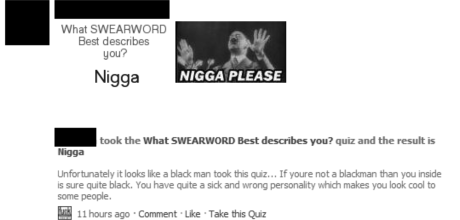To me, the most appealing aspect of the internet is its real-time environment: just a few clicks and you’re done.
The other day I encountered a situation that I thought would be a great example of the real-time web, but was stunned that events didn’t pan out that way.
I was using my Facebook account for the first time in a couple of months and, after I’d reactivated my account, was presented with the ‘my network activities’ page. I checked out what my friends had been up to and, half way down the page, I came across this (I’ve blanked out the personal information).

At first, I couldn’t believe that the application had been approved by a such a major website (I never take off my ‘digital’ hat!). But the more I looked at it, the more disbelieving I became. ‘Nigga’. An image of Hitler. And the phrase: “unfortunately it looks like a black man took this quiz…”
I was offended, but not mad. So I emailed one of my contacts at Facebook with the same image, suggesting they might want to remove the application, or at the least get the creator to modify it before someone tipped off the press or it spread across the web like wildfire. I thought I was doing Facebook a favour — it’s a brand I like.
I assumed I’d get a ‘thanks for pointing this out – we’re on it’ email and that would be my good deed for the day. Instead I received an email telling me the procedure I should take to make a complaint — i.e. go to the application’s Facebook page and fill in a lengthy set of questions.
I didn’t do that.
Instead I thought of all the backlash businesses have received via platforms such as Twitter, and why Facebook didn’t have a no-nonsense removal procedure for applications that contain racist language. Sure, there’s an argument that if you allow applications to be removed simply because people are offended, there’d be chaos — but this wasn’t simply about whether people were offended. It went much deeper.
Sadly, Facebook have disappointed me with their reaction. When digital offers such a benefit, such as real-time activity, it should be used in situations like this. It can still be: but if this image were in print media then it would be out there for good.
I might just Twitter about this…
